Technology in Audit Engagements
VerifiedAdded on 2022/11/13
|6
|1741
|202
AI Summary
This article discusses the impact of technology on the audit profession, including the adoption of Blockchain technology, audit support systems, and cognitive technology. It also emphasizes the importance of communication and the need for auditors to adopt necessary skills to remain relevant in the industry.
Contribute Materials
Your contribution can guide someone’s learning journey. Share your
documents today.
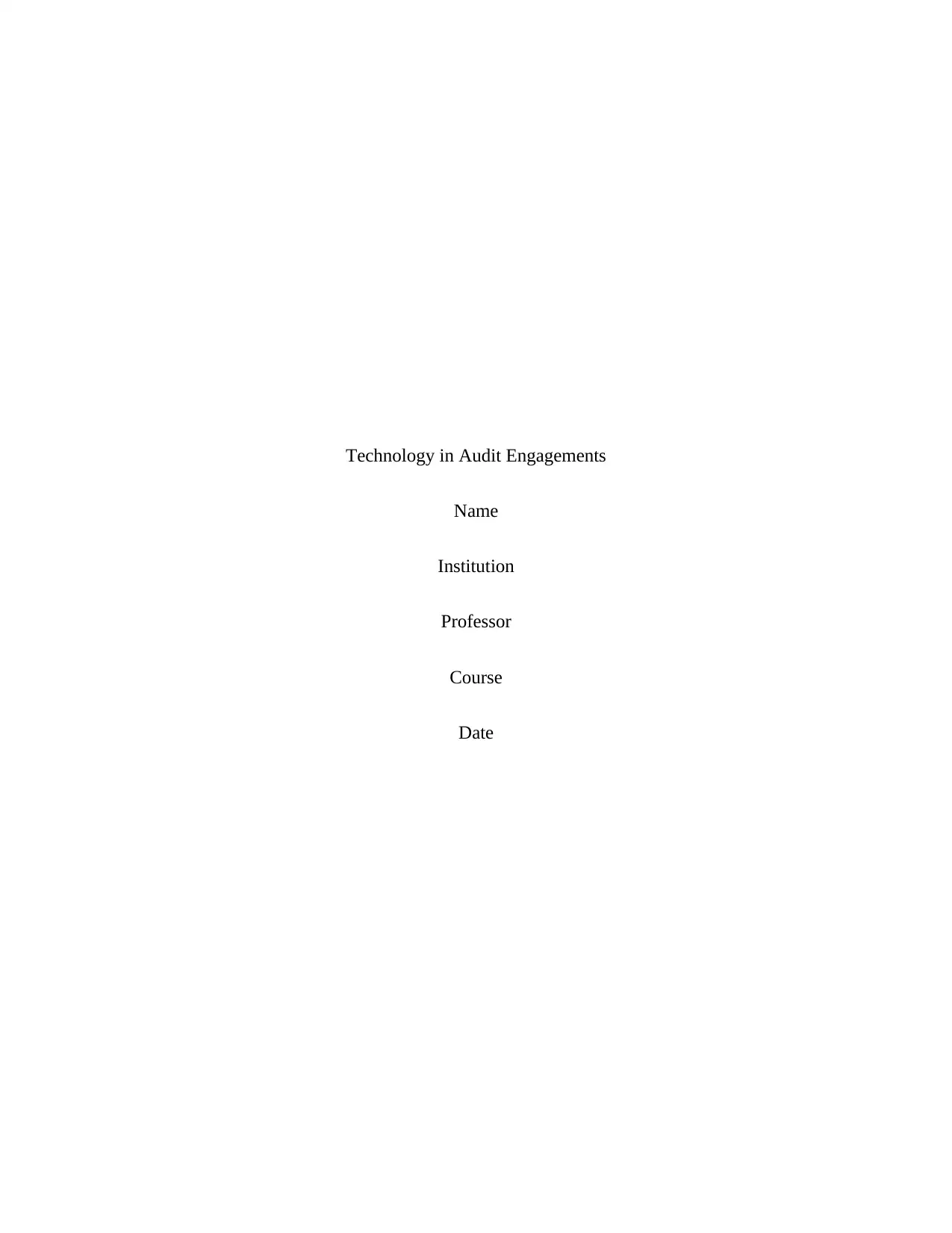
Technology in Audit Engagements
Name
Institution
Professor
Course
Date
Name
Institution
Professor
Course
Date
Secure Best Marks with AI Grader
Need help grading? Try our AI Grader for instant feedback on your assignments.
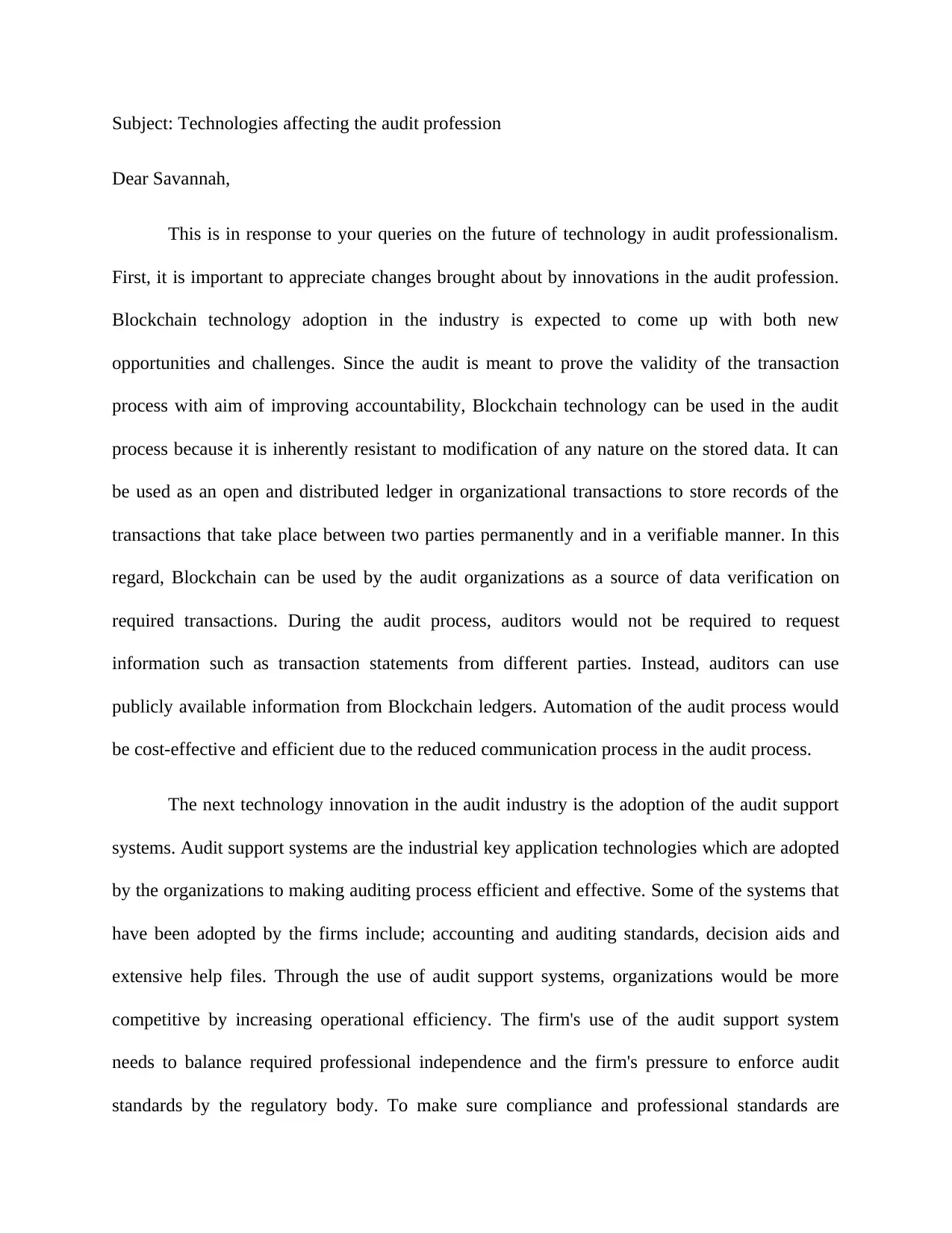
Subject: Technologies affecting the audit profession
Dear Savannah,
This is in response to your queries on the future of technology in audit professionalism.
First, it is important to appreciate changes brought about by innovations in the audit profession.
Blockchain technology adoption in the industry is expected to come up with both new
opportunities and challenges. Since the audit is meant to prove the validity of the transaction
process with aim of improving accountability, Blockchain technology can be used in the audit
process because it is inherently resistant to modification of any nature on the stored data. It can
be used as an open and distributed ledger in organizational transactions to store records of the
transactions that take place between two parties permanently and in a verifiable manner. In this
regard, Blockchain can be used by the audit organizations as a source of data verification on
required transactions. During the audit process, auditors would not be required to request
information such as transaction statements from different parties. Instead, auditors can use
publicly available information from Blockchain ledgers. Automation of the audit process would
be cost-effective and efficient due to the reduced communication process in the audit process.
The next technology innovation in the audit industry is the adoption of the audit support
systems. Audit support systems are the industrial key application technologies which are adopted
by the organizations to making auditing process efficient and effective. Some of the systems that
have been adopted by the firms include; accounting and auditing standards, decision aids and
extensive help files. Through the use of audit support systems, organizations would be more
competitive by increasing operational efficiency. The firm's use of the audit support system
needs to balance required professional independence and the firm's pressure to enforce audit
standards by the regulatory body. To make sure compliance and professional standards are
Dear Savannah,
This is in response to your queries on the future of technology in audit professionalism.
First, it is important to appreciate changes brought about by innovations in the audit profession.
Blockchain technology adoption in the industry is expected to come up with both new
opportunities and challenges. Since the audit is meant to prove the validity of the transaction
process with aim of improving accountability, Blockchain technology can be used in the audit
process because it is inherently resistant to modification of any nature on the stored data. It can
be used as an open and distributed ledger in organizational transactions to store records of the
transactions that take place between two parties permanently and in a verifiable manner. In this
regard, Blockchain can be used by the audit organizations as a source of data verification on
required transactions. During the audit process, auditors would not be required to request
information such as transaction statements from different parties. Instead, auditors can use
publicly available information from Blockchain ledgers. Automation of the audit process would
be cost-effective and efficient due to the reduced communication process in the audit process.
The next technology innovation in the audit industry is the adoption of the audit support
systems. Audit support systems are the industrial key application technologies which are adopted
by the organizations to making auditing process efficient and effective. Some of the systems that
have been adopted by the firms include; accounting and auditing standards, decision aids and
extensive help files. Through the use of audit support systems, organizations would be more
competitive by increasing operational efficiency. The firm's use of the audit support system
needs to balance required professional independence and the firm's pressure to enforce audit
standards by the regulatory body. To make sure compliance and professional standards are
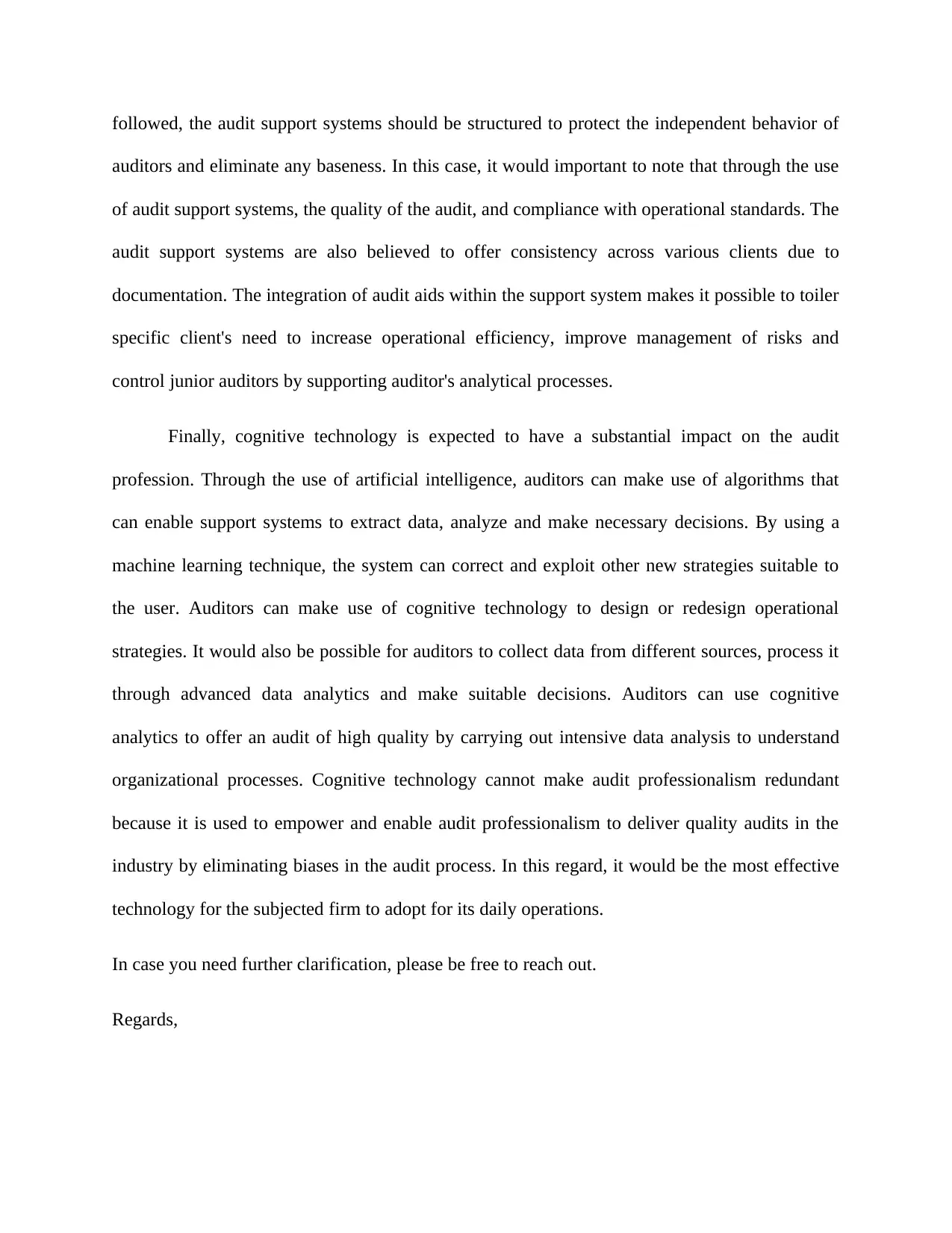
followed, the audit support systems should be structured to protect the independent behavior of
auditors and eliminate any baseness. In this case, it would important to note that through the use
of audit support systems, the quality of the audit, and compliance with operational standards. The
audit support systems are also believed to offer consistency across various clients due to
documentation. The integration of audit aids within the support system makes it possible to toiler
specific client's need to increase operational efficiency, improve management of risks and
control junior auditors by supporting auditor's analytical processes.
Finally, cognitive technology is expected to have a substantial impact on the audit
profession. Through the use of artificial intelligence, auditors can make use of algorithms that
can enable support systems to extract data, analyze and make necessary decisions. By using a
machine learning technique, the system can correct and exploit other new strategies suitable to
the user. Auditors can make use of cognitive technology to design or redesign operational
strategies. It would also be possible for auditors to collect data from different sources, process it
through advanced data analytics and make suitable decisions. Auditors can use cognitive
analytics to offer an audit of high quality by carrying out intensive data analysis to understand
organizational processes. Cognitive technology cannot make audit professionalism redundant
because it is used to empower and enable audit professionalism to deliver quality audits in the
industry by eliminating biases in the audit process. In this regard, it would be the most effective
technology for the subjected firm to adopt for its daily operations.
In case you need further clarification, please be free to reach out.
Regards,
auditors and eliminate any baseness. In this case, it would important to note that through the use
of audit support systems, the quality of the audit, and compliance with operational standards. The
audit support systems are also believed to offer consistency across various clients due to
documentation. The integration of audit aids within the support system makes it possible to toiler
specific client's need to increase operational efficiency, improve management of risks and
control junior auditors by supporting auditor's analytical processes.
Finally, cognitive technology is expected to have a substantial impact on the audit
profession. Through the use of artificial intelligence, auditors can make use of algorithms that
can enable support systems to extract data, analyze and make necessary decisions. By using a
machine learning technique, the system can correct and exploit other new strategies suitable to
the user. Auditors can make use of cognitive technology to design or redesign operational
strategies. It would also be possible for auditors to collect data from different sources, process it
through advanced data analytics and make suitable decisions. Auditors can use cognitive
analytics to offer an audit of high quality by carrying out intensive data analysis to understand
organizational processes. Cognitive technology cannot make audit professionalism redundant
because it is used to empower and enable audit professionalism to deliver quality audits in the
industry by eliminating biases in the audit process. In this regard, it would be the most effective
technology for the subjected firm to adopt for its daily operations.
In case you need further clarification, please be free to reach out.
Regards,
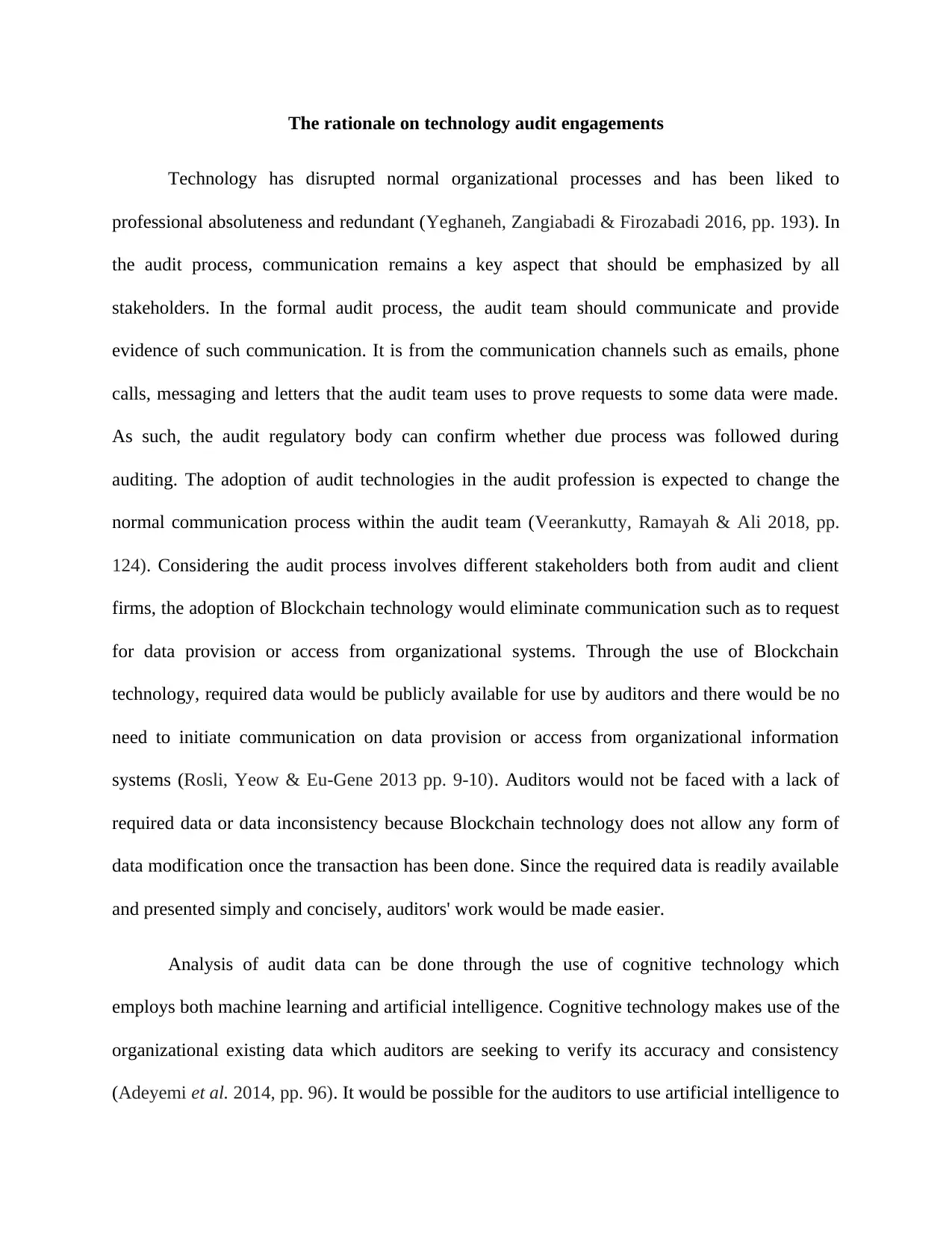
The rationale on technology audit engagements
Technology has disrupted normal organizational processes and has been liked to
professional absoluteness and redundant (Yeghaneh, Zangiabadi & Firozabadi 2016, pp. 193). In
the audit process, communication remains a key aspect that should be emphasized by all
stakeholders. In the formal audit process, the audit team should communicate and provide
evidence of such communication. It is from the communication channels such as emails, phone
calls, messaging and letters that the audit team uses to prove requests to some data were made.
As such, the audit regulatory body can confirm whether due process was followed during
auditing. The adoption of audit technologies in the audit profession is expected to change the
normal communication process within the audit team (Veerankutty, Ramayah & Ali 2018, pp.
124). Considering the audit process involves different stakeholders both from audit and client
firms, the adoption of Blockchain technology would eliminate communication such as to request
for data provision or access from organizational systems. Through the use of Blockchain
technology, required data would be publicly available for use by auditors and there would be no
need to initiate communication on data provision or access from organizational information
systems (Rosli, Yeow & Eu-Gene 2013 pp. 9-10). Auditors would not be faced with a lack of
required data or data inconsistency because Blockchain technology does not allow any form of
data modification once the transaction has been done. Since the required data is readily available
and presented simply and concisely, auditors' work would be made easier.
Analysis of audit data can be done through the use of cognitive technology which
employs both machine learning and artificial intelligence. Cognitive technology makes use of the
organizational existing data which auditors are seeking to verify its accuracy and consistency
(Adeyemi et al. 2014, pp. 96). It would be possible for the auditors to use artificial intelligence to
Technology has disrupted normal organizational processes and has been liked to
professional absoluteness and redundant (Yeghaneh, Zangiabadi & Firozabadi 2016, pp. 193). In
the audit process, communication remains a key aspect that should be emphasized by all
stakeholders. In the formal audit process, the audit team should communicate and provide
evidence of such communication. It is from the communication channels such as emails, phone
calls, messaging and letters that the audit team uses to prove requests to some data were made.
As such, the audit regulatory body can confirm whether due process was followed during
auditing. The adoption of audit technologies in the audit profession is expected to change the
normal communication process within the audit team (Veerankutty, Ramayah & Ali 2018, pp.
124). Considering the audit process involves different stakeholders both from audit and client
firms, the adoption of Blockchain technology would eliminate communication such as to request
for data provision or access from organizational systems. Through the use of Blockchain
technology, required data would be publicly available for use by auditors and there would be no
need to initiate communication on data provision or access from organizational information
systems (Rosli, Yeow & Eu-Gene 2013 pp. 9-10). Auditors would not be faced with a lack of
required data or data inconsistency because Blockchain technology does not allow any form of
data modification once the transaction has been done. Since the required data is readily available
and presented simply and concisely, auditors' work would be made easier.
Analysis of audit data can be done through the use of cognitive technology which
employs both machine learning and artificial intelligence. Cognitive technology makes use of the
organizational existing data which auditors are seeking to verify its accuracy and consistency
(Adeyemi et al. 2014, pp. 96). It would be possible for the auditors to use artificial intelligence to
Secure Best Marks with AI Grader
Need help grading? Try our AI Grader for instant feedback on your assignments.
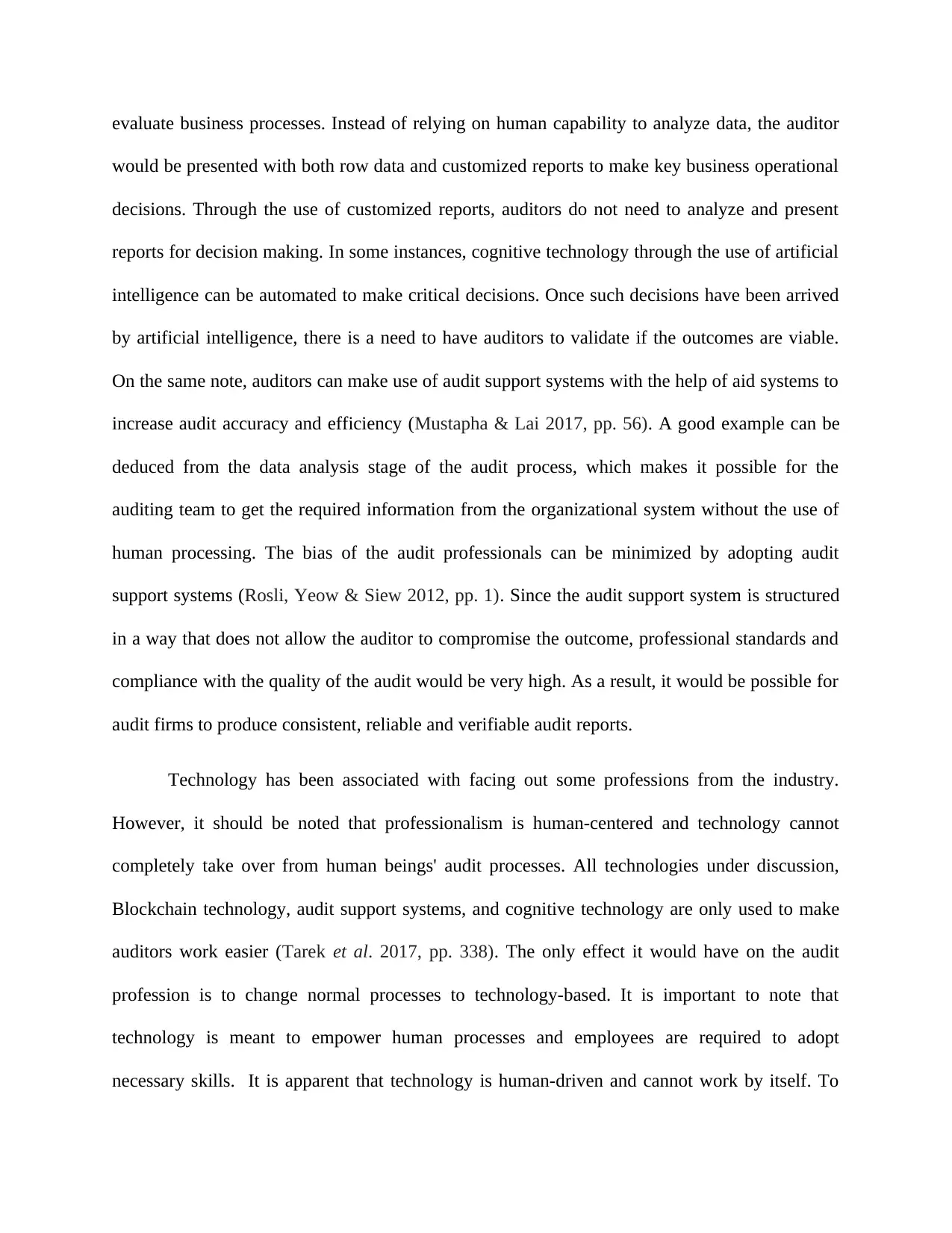
evaluate business processes. Instead of relying on human capability to analyze data, the auditor
would be presented with both row data and customized reports to make key business operational
decisions. Through the use of customized reports, auditors do not need to analyze and present
reports for decision making. In some instances, cognitive technology through the use of artificial
intelligence can be automated to make critical decisions. Once such decisions have been arrived
by artificial intelligence, there is a need to have auditors to validate if the outcomes are viable.
On the same note, auditors can make use of audit support systems with the help of aid systems to
increase audit accuracy and efficiency (Mustapha & Lai 2017, pp. 56). A good example can be
deduced from the data analysis stage of the audit process, which makes it possible for the
auditing team to get the required information from the organizational system without the use of
human processing. The bias of the audit professionals can be minimized by adopting audit
support systems (Rosli, Yeow & Siew 2012, pp. 1). Since the audit support system is structured
in a way that does not allow the auditor to compromise the outcome, professional standards and
compliance with the quality of the audit would be very high. As a result, it would be possible for
audit firms to produce consistent, reliable and verifiable audit reports.
Technology has been associated with facing out some professions from the industry.
However, it should be noted that professionalism is human-centered and technology cannot
completely take over from human beings' audit processes. All technologies under discussion,
Blockchain technology, audit support systems, and cognitive technology are only used to make
auditors work easier (Tarek et al. 2017, pp. 338). The only effect it would have on the audit
profession is to change normal processes to technology-based. It is important to note that
technology is meant to empower human processes and employees are required to adopt
necessary skills. It is apparent that technology is human-driven and cannot work by itself. To
would be presented with both row data and customized reports to make key business operational
decisions. Through the use of customized reports, auditors do not need to analyze and present
reports for decision making. In some instances, cognitive technology through the use of artificial
intelligence can be automated to make critical decisions. Once such decisions have been arrived
by artificial intelligence, there is a need to have auditors to validate if the outcomes are viable.
On the same note, auditors can make use of audit support systems with the help of aid systems to
increase audit accuracy and efficiency (Mustapha & Lai 2017, pp. 56). A good example can be
deduced from the data analysis stage of the audit process, which makes it possible for the
auditing team to get the required information from the organizational system without the use of
human processing. The bias of the audit professionals can be minimized by adopting audit
support systems (Rosli, Yeow & Siew 2012, pp. 1). Since the audit support system is structured
in a way that does not allow the auditor to compromise the outcome, professional standards and
compliance with the quality of the audit would be very high. As a result, it would be possible for
audit firms to produce consistent, reliable and verifiable audit reports.
Technology has been associated with facing out some professions from the industry.
However, it should be noted that professionalism is human-centered and technology cannot
completely take over from human beings' audit processes. All technologies under discussion,
Blockchain technology, audit support systems, and cognitive technology are only used to make
auditors work easier (Tarek et al. 2017, pp. 338). The only effect it would have on the audit
profession is to change normal processes to technology-based. It is important to note that
technology is meant to empower human processes and employees are required to adopt
necessary skills. It is apparent that technology is human-driven and cannot work by itself. To
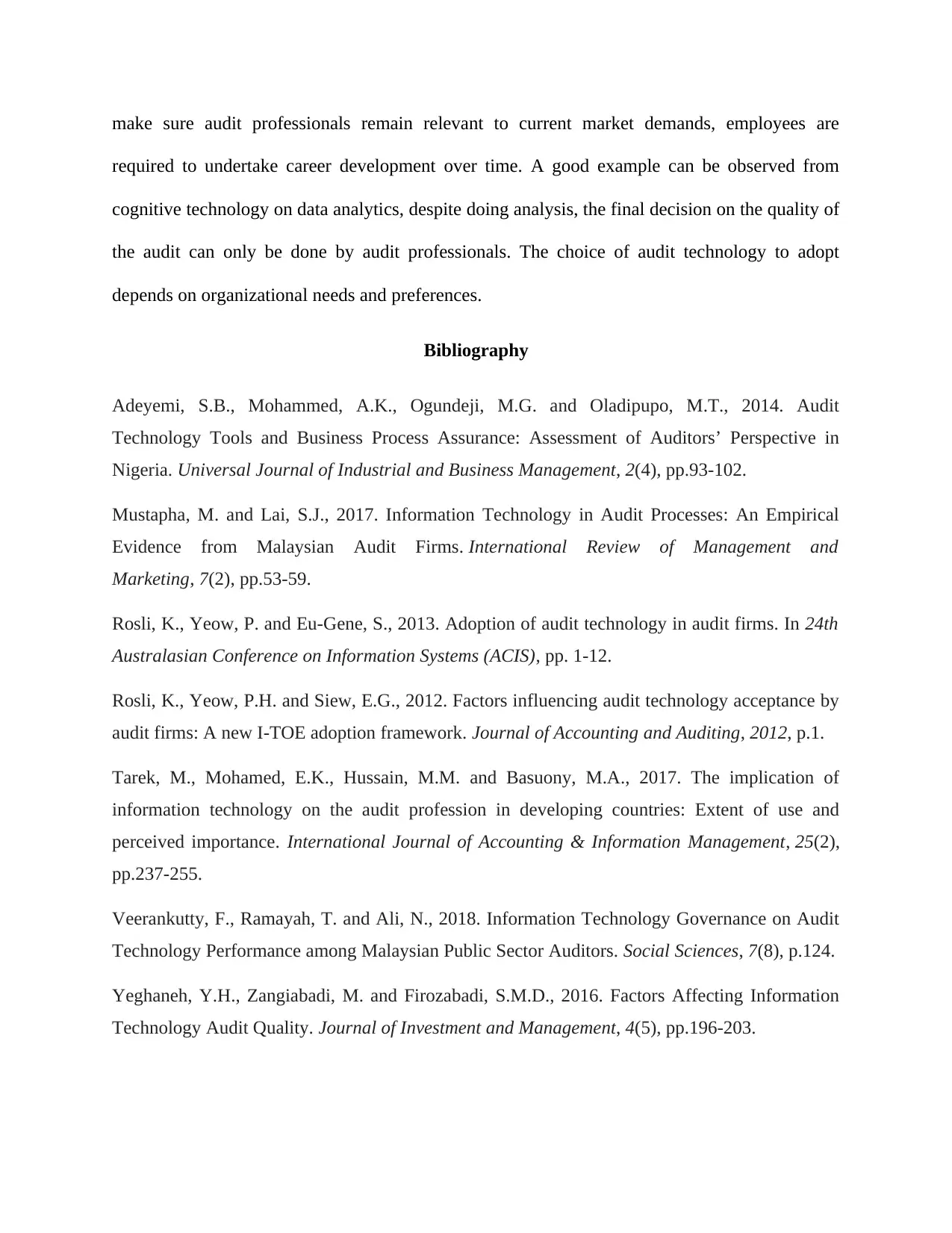
make sure audit professionals remain relevant to current market demands, employees are
required to undertake career development over time. A good example can be observed from
cognitive technology on data analytics, despite doing analysis, the final decision on the quality of
the audit can only be done by audit professionals. The choice of audit technology to adopt
depends on organizational needs and preferences.
Bibliography
Adeyemi, S.B., Mohammed, A.K., Ogundeji, M.G. and Oladipupo, M.T., 2014. Audit
Technology Tools and Business Process Assurance: Assessment of Auditors’ Perspective in
Nigeria. Universal Journal of Industrial and Business Management, 2(4), pp.93-102.
Mustapha, M. and Lai, S.J., 2017. Information Technology in Audit Processes: An Empirical
Evidence from Malaysian Audit Firms. International Review of Management and
Marketing, 7(2), pp.53-59.
Rosli, K., Yeow, P. and Eu-Gene, S., 2013. Adoption of audit technology in audit firms. In 24th
Australasian Conference on Information Systems (ACIS), pp. 1-12.
Rosli, K., Yeow, P.H. and Siew, E.G., 2012. Factors influencing audit technology acceptance by
audit firms: A new I-TOE adoption framework. Journal of Accounting and Auditing, 2012, p.1.
Tarek, M., Mohamed, E.K., Hussain, M.M. and Basuony, M.A., 2017. The implication of
information technology on the audit profession in developing countries: Extent of use and
perceived importance. International Journal of Accounting & Information Management, 25(2),
pp.237-255.
Veerankutty, F., Ramayah, T. and Ali, N., 2018. Information Technology Governance on Audit
Technology Performance among Malaysian Public Sector Auditors. Social Sciences, 7(8), p.124.
Yeghaneh, Y.H., Zangiabadi, M. and Firozabadi, S.M.D., 2016. Factors Affecting Information
Technology Audit Quality. Journal of Investment and Management, 4(5), pp.196-203.
required to undertake career development over time. A good example can be observed from
cognitive technology on data analytics, despite doing analysis, the final decision on the quality of
the audit can only be done by audit professionals. The choice of audit technology to adopt
depends on organizational needs and preferences.
Bibliography
Adeyemi, S.B., Mohammed, A.K., Ogundeji, M.G. and Oladipupo, M.T., 2014. Audit
Technology Tools and Business Process Assurance: Assessment of Auditors’ Perspective in
Nigeria. Universal Journal of Industrial and Business Management, 2(4), pp.93-102.
Mustapha, M. and Lai, S.J., 2017. Information Technology in Audit Processes: An Empirical
Evidence from Malaysian Audit Firms. International Review of Management and
Marketing, 7(2), pp.53-59.
Rosli, K., Yeow, P. and Eu-Gene, S., 2013. Adoption of audit technology in audit firms. In 24th
Australasian Conference on Information Systems (ACIS), pp. 1-12.
Rosli, K., Yeow, P.H. and Siew, E.G., 2012. Factors influencing audit technology acceptance by
audit firms: A new I-TOE adoption framework. Journal of Accounting and Auditing, 2012, p.1.
Tarek, M., Mohamed, E.K., Hussain, M.M. and Basuony, M.A., 2017. The implication of
information technology on the audit profession in developing countries: Extent of use and
perceived importance. International Journal of Accounting & Information Management, 25(2),
pp.237-255.
Veerankutty, F., Ramayah, T. and Ali, N., 2018. Information Technology Governance on Audit
Technology Performance among Malaysian Public Sector Auditors. Social Sciences, 7(8), p.124.
Yeghaneh, Y.H., Zangiabadi, M. and Firozabadi, S.M.D., 2016. Factors Affecting Information
Technology Audit Quality. Journal of Investment and Management, 4(5), pp.196-203.
1 out of 6
Related Documents
Your All-in-One AI-Powered Toolkit for Academic Success.
+13062052269
info@desklib.com
Available 24*7 on WhatsApp / Email
![[object Object]](/_next/static/media/star-bottom.7253800d.svg)
Unlock your academic potential
© 2024 | Zucol Services PVT LTD | All rights reserved.





